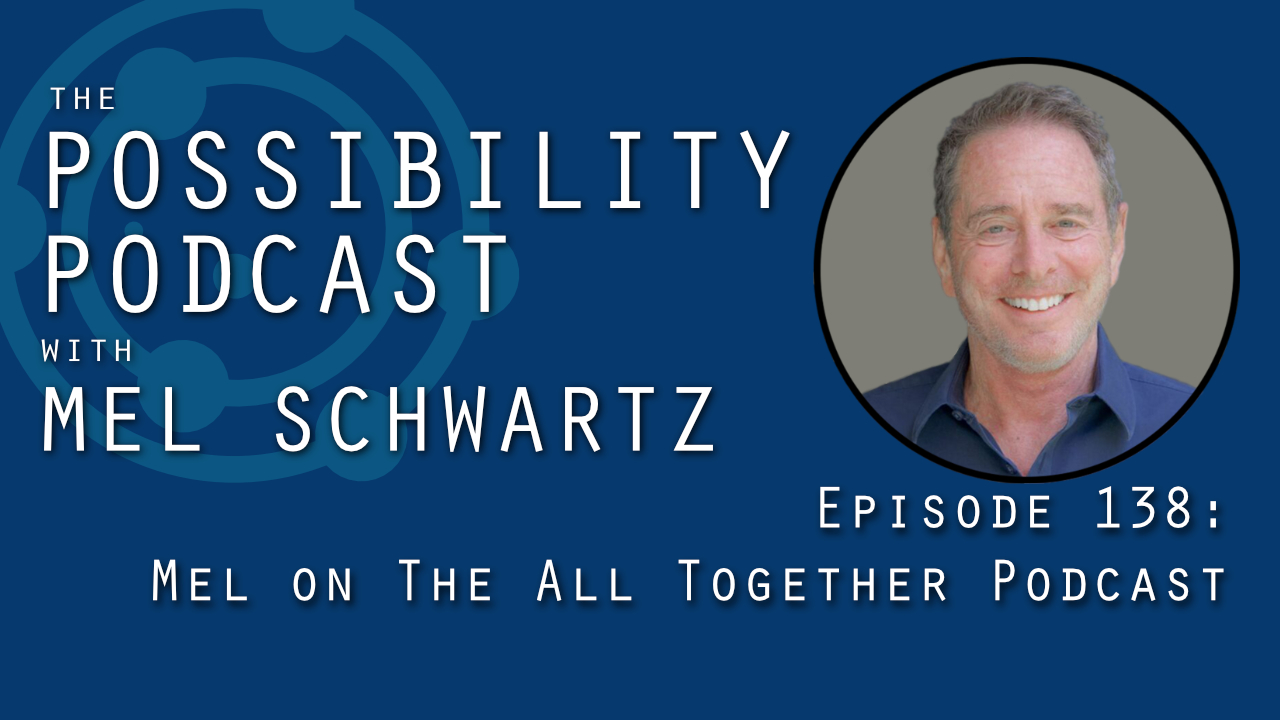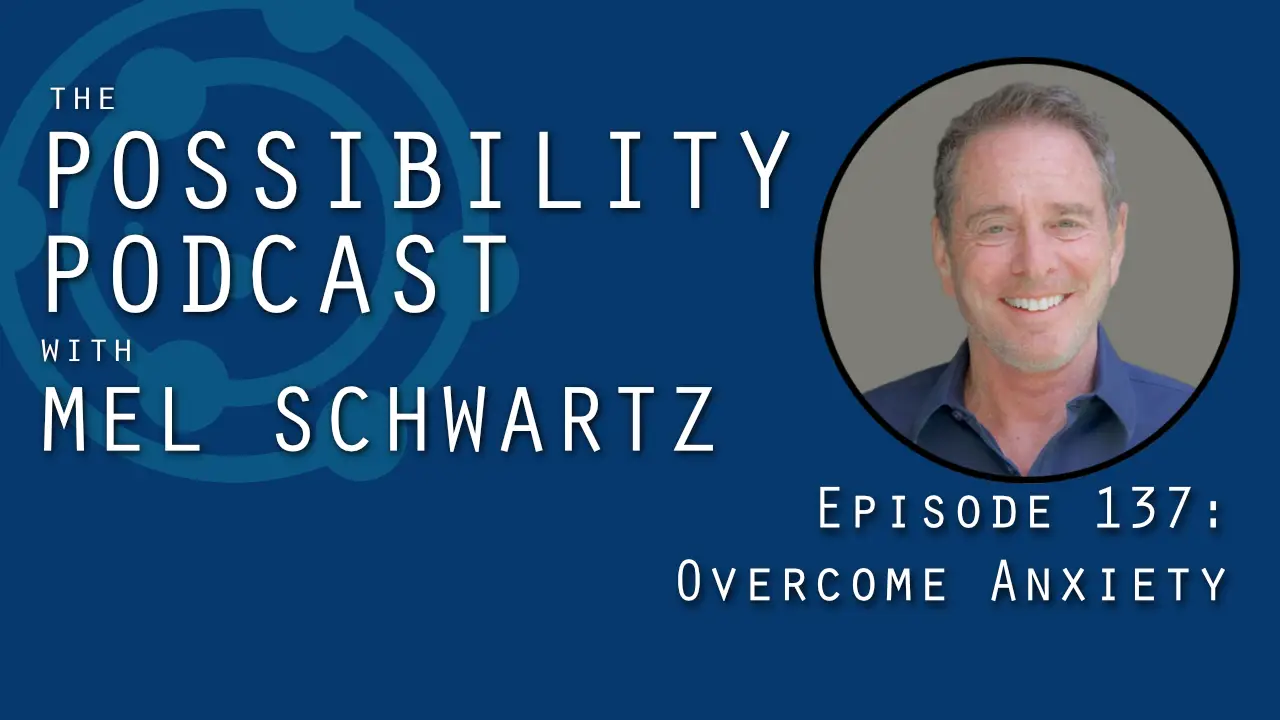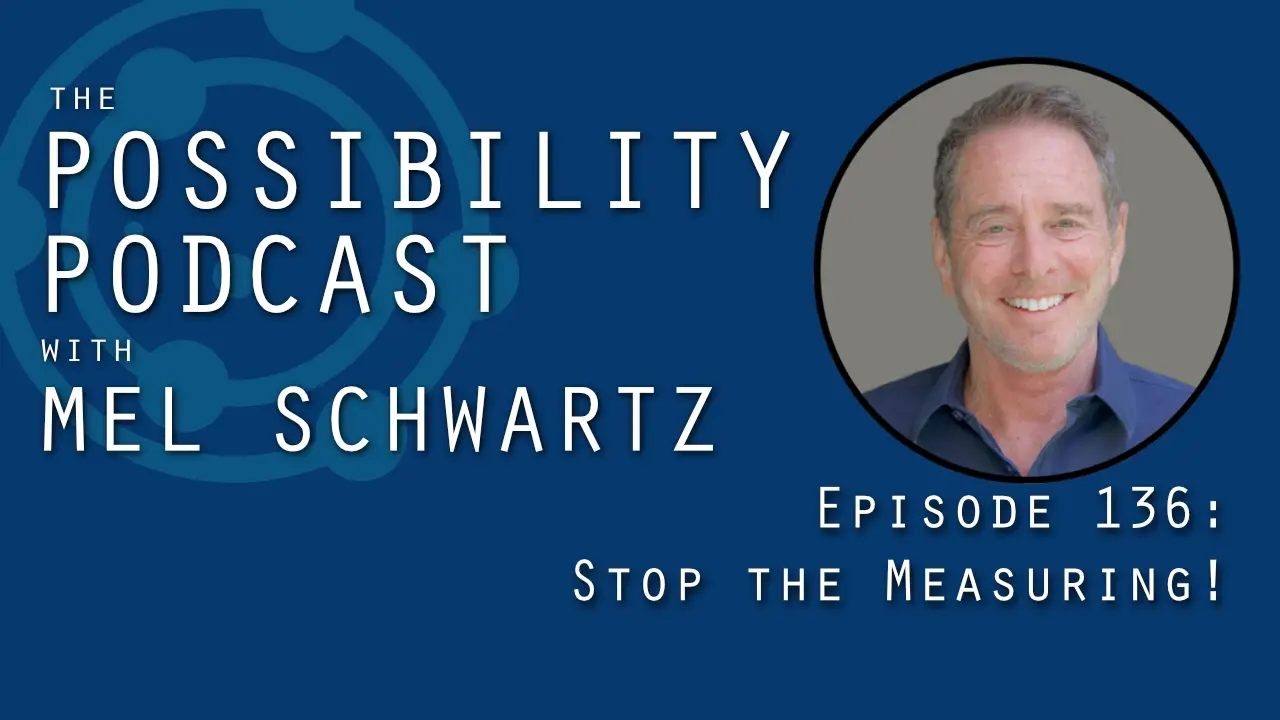Podcast: Play in new window | Download
In episode 087 of The Possibility Podcast with Mel Schwartz, I explain why there’s a big difference between reacting and responding, and why it’s so much better in our relationships to thoughtfully respond rather than instinctively react.
Have you practiced the steps I spell out in this episode to thoughtfully respond, rather than react? I’d love for you to share your thoughts and experiences… in the comments!
Interested in bespoke marriage and relationship counseling from Mel Schwartz? Reach out!
Subscribe to The Possibility Podcast with Mel Schwartz
Don’t miss a single Possibility Podcast with Mel Schwartz! Subscribe for free in iTunes / Apple Podcasts, YouTube, Spotify, RadioPublic, Spreaker, or wherever you listen to podcasts. Or, simply copy / paste the RSS link directly into the podcast app of your choice!
Please Rate and Review
If you enjoy The Possibility Podcast with Mel Schwartz, please take a moment to rate and review the show in iTunes / Apple Podcasts or Podchaser. It only takes a few minutes, and adding your review is as easy as clicking this link.
Your rating and review helps raise the visibility of The Possibility Podcast with Mel Schwartz, especially on iTunes / Apple Podcasts, which is one of the biggest podcasting platforms today. More visibility for the show means more listeners… and that growth means the show reaches — and helps — more people like you.
Thank you!
Talk With Mel!
Help others when Mel helps you: Contact Mel and find out how you can be a caller on the show and ask Mel a question. He’ll put the Possibility Principle to work for you, and your conversation will be recorded for use in a future episode of the podcast so other listeners can benefit.
Transcript of The Possibility Podcast with Mel Schwartz #087
Hello everybody and welcome to The Possibility Podcast. I’m your host Mel Schwartz. I practice psychotherapy and marriage counseling and I am the author of the book The Possibility Principle, the inspiration and the companion to this podcast. I’ll be introducing you to new ways of thinking, a new philosophy and a new game plan for life and all of the infinite possibilities that await you. I’m going to be speaking with you today about the vast difference between reacting or responding, whether we’re in conversation with somebody else, whether we’re triggered by what they’ve said or they haven’t said, or even in relationship to our own thoughts and feelings.
The difference between reacting and responding is just a nanosecond, but that nanosecond is all the time in the universe and it makes such a difference. Here’s what I mean. When we become our feeling, and let’s suppose it is an alarmed, negative, angry feeling or judgmental feeling. When we become that feeling instinctively, instantly in a moment, we are reacting and when we react in that moment, all is lost. So when I react in that moment, it means I’ve been triggered. I’m not being thoughtful. I’m not being reflective. I’m simply simply reacting.
Now if I can notice that feeling and not become the feeling then I can communicate what I’m feeling. So let’s suppose I’m speaking with somebody and I am feeling angry or insulted or devalued by what they’ve said to me. Well if I can notice what I’m feeling then I don’t have to become that feeling. So here’s what it would sound like. John said something that I thought was really hurtful. I noticed that I’m feeling angry or misunderstood. I pause.
I don’t want to become my feeling. I say to John, you know when you just said that to me, I felt really hurt. I felt devalued or misunderstood or I felt marginalized. Let me tell you why. Now that’s a healthy communication. I’m expressing to John just what I am feeling and speaking that way, not angrily, defensively, or reacting, would enable John to possibly take in what I have to say. That’s my goal isn’t it? So that John can have an opportunity to validate me and care as to what I’m saying.
In our communications, particularly troubled communications the goal is to understand each other and connect not to win. And to do that, we have to temporarily witness and suspend what our thoughts are telling us and our feelings. Remember, our thoughts get in the way of our ability to listen. Old thought represents the past, so we’re not truly present to what the other person is saying. Now, to listen closely to each other, we need to notice any disturbances created from old thoughts and feelings and reactions and at least suspend them for a moment. We temporarily have to avoid taking a position.
When we react to someone’s words without pausing to reflect, we are stuck in the groove of old thought, automatic thought and old feeling. In short, we’re not present. There’s an entrainment coming from old thoughts, old feelings, old wounds, and old wave collapses and our thoughts operate from an assumption. The assumption in this case might be that we understand that we absolutely get what the other person is intending, but we often don’t. And as a result, we’re not reacting only to one person in the moment, but to a complex of a lifetime of interactions with other people and an incalculable number of experiences that are underneath our conscious awareness.
In other words, we’re not reacting to just what we’re hearing and dealing with in a moment. Now the distance between the reaction of a millisecond or a nanosecond and a thoughtful response just takes a moment, but that moment is monumental.
It’s the difference between blasting your horn or a tailgating and getting into road rage or keeping your hands on the wheel and keeping your foot gently on the brake. That fraction of a moment in which you suspend your reaction and that’s another example of the possibility principle that reality is waiting for you to create it.
So that fraction of a moment in which you suspend your reaction that creates a state of potential, a state of possibility whereby you can facilitate a new way of communicating. This allows for profound breakthroughs in communication and for incredible possibilities in relationships. Learning to observe your reaction helps you not to become your reaction. Just as seeing your thought allows you not to become your thought.
I’d love to show you my appreciation for your subscribing to and rating this podcast by offering you a gift to one of the following, The Power of Mind, a live talk that I gave, or one of my digital e-books, Creating Authentic Self-Esteem, Overcoming Anxiety, or Raising Resilient Children, and lastly, Cultivating Resilient Relationships. Once you have subscribed, please send an email to mel at melschwartz.com and just let me know which gift you prefer. Thanks.
Again, looking at anger, if I notice I’m feeling angry, but I refrain from actualizing the anger, I can communicate how I feel appropriately. If I react and become the anger, my angry words are likely going to exacerbate the situation and be met with a tirade coming back at me, which of course can damage or irreparably damage a relationship. If I’m feeling hurt or misunderstood, I want the other person to get it. Becoming angry ensures that they won’t.
So my ensuing actions may then shine the spotlight on my behavior instead of the underlying issue at hand. But if I say I’m feeling angry and I want to explain to you why, I increase the likelihood that the other person, especially if they’re close to me, will care about how I feel and maybe we can have a real dialogue about what’s to ensue.
This ability of not becoming reactive opens us to the art of listening. So the key here is to slow down, breathe deeply, and try to notice your reaction. Don’t become the reaction, see it and communicate it. And the next time you feel the urge to defend yourself or your position in an interaction or an argument with another person, stop and reflect. Ask yourself a couple of things. What is the other person trying to convey?
What is it that they want me to know? What is it that they’re seeing in me that I’m not seeing in myself? Secondly, is it more important for me to defend my position and correct the other person or to stay present? In other words, would I rather be right, fight a battle where both people lose, or engage in some genuine dialogue?
Try to remain still and take a moment to ask yourself these things. The difference between reacting and responding can also be seen through the filter of learning to lean in, which you’ve heard me speak about any number of times. So rather than get angry, lean in and say, I need some clarification on what you’re saying. I was feeling angry, I was feeling hurt, but I want to make sure I understand what it is you’re trying to communicate to me.
Can you see that that leaning in quality actually creates the space to not become reactive? Pause, lean in, notice what you’re feeling, communicate it and have curiosity and ask the other person what you’re feeling and what you’re experiencing. Is that what they intended for you to feel? You need to create a bridge between each other to create real dialogue. And most often we are miscommunicating with each other.
Remember the keys to not reacting. Slow down, count to three, notice your feeling, exhale and communicate your feeling. Number two, reach out to the other person and ask them what you’re hearing, what you’re receiving, is that what they intended for you to hear.
Until next time, wishing you less reactivity in your lives and more ability to be responsive. Be well, look forward to speaking with you again soon.
I hope you enjoyed this episode of the Possibility Podcast and I welcome your feedback on this or any episode. Please send me an email at mel at melschwartz.com or leave a comment in the show notes for this episode at melschwartz.com.
If you like what you’re hearing, please take a moment to rate and review the show at Apple Podcasts, Spotify, or wherever you get your podcasts. Your reviews really help boost the visibility for the show and it’s a great way for you to show your support.
Finally, please make sure to subscribe to the Possibility Podcast wherever you listen to podcasts, and that way you’ll never miss an episode. And thanks again, and please remember to always welcome uncertainty into your life as you embrace new possibilities.





You have given an excellent analysis and plan for how to achieve a positive,comfortable outcome when communication hits a bump in the road